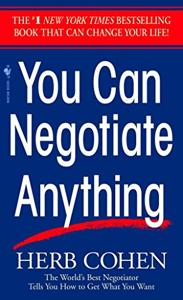
Want to learn the ideas in You Can Negotiate Anything better than ever? Read the world’s #1 book summary of You Can Negotiate Anything by Herb Cohen here.
Read a brief 1-Page Summary or watch video summaries curated by our expert team. Note: this book guide is not affiliated with or endorsed by the publisher or author, and we always encourage you to purchase and read the full book.
Video Summaries of You Can Negotiate Anything
We’ve scoured the Internet for the very best videos on You Can Negotiate Anything, from high-quality videos summaries to interviews or commentary by Herb Cohen.
1-Page Summary of You Can Negotiate Anything
Overview
Life is a never-ending negotiation. In any situation where you want to affect another person’s behavior, it’s basically a negotiation.
Most things in the world can be negotiated. For example, prices at fancy department stores, mortgages and speeding tickets are all negotiable if you know how to negotiate. Even notoriously inflexible entities such as the IRS will negotiate with you because they’re ultimately just people like everyone else. Therefore, don’t you think it’s time we started improving our negotiation skills?
Sometimes, negotiating simply requires talking to the right person. Every organization has a hierarchy, and it’s always the lower rungs that have less power to grant what you want. So if they can’t help you, ask for managers until you find someone with enough authority to make concessions. Once at a Mexican hotel, I was told that there were no rooms available. I asked for the manager and said “Wouldn’t you have room for the president of Mexico if he showed up?” The manager replied “Yes.” I then said: “Well he’s not coming so I’ll take his room!” In general, only factors such as whether your needs will be met should affect your decision about whether or not to negotiate something.
Many things in the world can be negotiated. Therefore, you should learn how to negotiate well.
Big Idea #1: Avoid Soviet-style negotiators – they mistake negotiations for battlefields.
Some people see negotiations as a win-lose battle, where one party’s gain is always the other party’s loss. This “winning at all costs” strategy is deployed around the globe, but particularly in the former Soviet Union. You must be able to identify it and protect yourself against it.
Soviet-style negotiators take unreasonable positions and are unwilling to make significant concessions. When the Soviet Union was looking for land for its embassy’s recreational use, it offered $125,000 for property worth $420,000. When the seller dropped the price to $360,000, they viewed this as a sign of weakness.
Eventually, they raised their offer to $133,000. This is a typical Soviet-style tactic where negotiators hope that the pressure of the deadline will make you cave in. Other common tactics include using negotiators with limited authority who can’t give concessions on their own and making last minute offers when you’re desperate for an agreement.
Emotional tactics are often used in negotiations. For example, a person may cry or threaten to walk out of the room if they don’t get what they want. This is common with spouses, for example. It’s also common in business and other situations where people negotiate contracts and deals.
If you encounter a Soviet-style negotiator, you might simply want to walk away. If you do enter the fray, however, there are certain things that will help make it more productive for both sides. First of all, be sure to adhere to limits that have been set previously and remain calm even when the other side is using emotional tactics. Negotiate with Soviet-style negotiators at your own peril – they see negotiations as battlefields instead of opportunities for cooperation.
Big Idea #2: Collaborative win-win negotiations are possible when everyone’s needs are identified and harmonized.
A win-lose negotiation mindset means that there is a set amount of “pie” to be divided up, and each party must fight for theirs. If both parties fight ferociously, a compromise will most likely occur. A true win-win negotiation is also possible.
Negotiations usually involve the other party making demands, but it’s really important to figure out their needs and desires. Every person has unique needs that can be met without one side losing anything.





